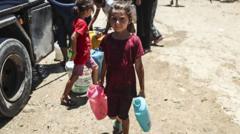Israel's Defense Minister has announced plans to move the population of Gaza into a camp in Rafah, amid criticisms that this could amount to ethnic cleansing and a violation of international law.
Israeli Minister Proposes Relocation of Gaza's Population Amid Ongoing Conflict

Israeli Minister Proposes Relocation of Gaza's Population Amid Ongoing Conflict
The Israeli government's plan to establish a "humanitarian city" for Palestinians in Rafah raises serious ethical and legal questions internationally.
Israeli Defense Minister Israel Katz has revealed plans to establish a "humanitarian city" in Rafah, intended to relocate Gaza's population, with reports indicating up to 600,000 Palestinians could initially be moved there. This controversial proposal comes as the Israeli military continues its campaign against Hamas, which escalated after an unprecedented attack on October 7, 2023, resulting in significant loss of life in both Israel and Gaza.
Katz articulated a desire for comprehensive security screenings of those relocated to ensure they do not have affiliations with Hamas. As preparations for this “city” advance, a 60-day ceasefire is being brokered between Israel and Hamas, and construction could commence under those conditions. However, critics, including human rights advocates, have denounced the plan as a potential violation of international law, labeling it an operational plan for a crime against humanity.
Michael Sfard, an Israeli human rights lawyer, condemned the move, stating it essentially facilitates the transfer of the Gazan population to prepare for eventual deportation outside the territory. The United Nations has made clear that such forced relocations of civilian populations from occupied territory could be classified under ethnic cleansing as per humanitarian laws.
On the diplomatic front, Israeli Prime Minister Benjamin Netanyahu discussed potential U.S. involvement in the post-war resettlement of Gazans during a meeting with President Donald Trump. Netanyahu characterized the plan as promoting free choice, where Palestinians would have the option to remain or leave as they see fit, although this raises further fears from Palestinians of historical parallels to the Nakba in 1948.
This turbulent backdrop comes against the harsh realities faced by those in Gaza today, where the humanitarian situation has deteriorated significantly due to ongoing conflict—over 57,500 people reportedly killed and infrastructure, including housing and healthcare systems, devastated. With more than 90% of homes damaged or destroyed and severe shortages of essential resources, the future for the current residents of Gaza remains precarious amid these escalations and proposed displacements.




















